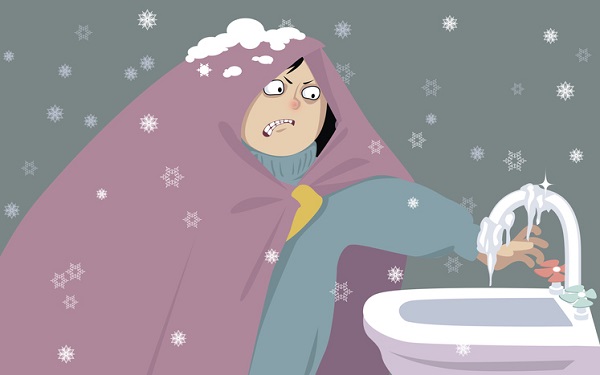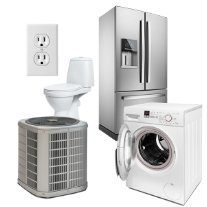With more extreme weather each year, it’s becoming more common for homeowners to experience deep freezes in the winter. This is especially tough for homeowners in warmer climates whose water pipes may not be ready for the freeze. Frozen pipes can equal a plumbing (and financial) disaster if your pipes burst. Here are some tips you can use to keep your pipes working properly and keep an expensive visit from the plumber at bay.
How Do I Keep My Pipes From Freezing?
When the temperatures start to dip below freezing, make sure you take these steps to protect your home:
- Let your indoor faucets drip slowly with cold water. This keeps water moving and reduces pressure in your water pipes. Choose the faucet that’s farthest away from where water enters your home if possible. This ensures that water is flowing through all of the home’s pipes. When in doubt, make sure that at least one faucet drips slowly.
- Use foam insulation on exterior pipes. First, do a thorough run-through around your house, looking for water supply lines in unheated areas (e.g., basement, garage, crawl space, and inside cabinets). Then, insulate those pipes.
- Keep kitchen and other cabinet doors open when it gets especially cold out. This allows warm air from your home’s heater to reach the plumbing.
- Set your thermostat to no lower than 55°F, especially if you’re taking a vacation in the winter.
- Drain all of your outdoor hoses and store them. Do not leave them attached to the spigots, as this is a common cause of water pipe leaking and bursting.
- Keep your outside hose bibbs (faucets) and outside valve open. That way, if there’s any water left in your pipes, it can drain.
- Always winterize your sprinkler system.
You might also want to install specific products to protect your pipes, like faucet covers and freeze caps.
What Should I Do If My Pipes Are Already Frozen?
If cold weather sneaks up on you and freezes your pipes, not all is lost. If you move quickly, you can prevent frozen pipes from leaking or bursting by thawing them. But how can you tell whether your pipes are frozen?
If you turn on a faucet in cold weather and there’s only a trickle of water, there’s a good chance you have frozen pipes in your home.
To thaw your interior pipes, try the following method.
- Turn the cold water on.
- Look for signs of pipe freezing near the trickling tap, such as condensation, frost, or pipes that are cold to the touch.
- Heat the frozen portion of pipe. You can use a hair dryer, a space heater, hot towels, or a heating pad. Never use an open flame, like a blowtorch.
Once you’ve fixed the problem, it’s smart to turn on the rest of the faucets in your house, too. If one pipe froze, there’s a high likelihood that others have as well.
If these methods don’t work, you may need to call a professional, as the frozen pipe may be behind a wall, underground, or encased.
Which Types of Water Pipes Freeze Most Often?
Certain pipes in and around your home are more likely to freeze than others.
- Pipes on exterior walls, due to little or no insulation in those areas.
- Pipes in unheated parts of your home, like the ones in your garage or crawl spaces.
- Outdoor water supply pipes, like sprinkler and pool supply lines.
The plumbing in these areas requires a bit of extra attention throughout the winter and the colder parts of spring.
Does a Home Warranty Cover Frozen Pipes and Any Damage?
No, a home warranty does not cover frozen pipes or damage caused by frozen pipes. That’s because a home warranty covers breakdowns caused by routine wear and tear. Breakdowns caused by weather are problems for homeowners insurance to fix.
However, 2-10 Home Buyers Warranty provides maintenance tips like these to homeowners often. In addition, our Home Service Plans could help homeowners save money when addressing routine plumbing breakdowns.
With the weather getting wilder each and every year, you may need to take precautions you hadn’t taken in the past. As you enter the cold seasons, make sure to use these tips to prevent pipes in your home from freezing.









